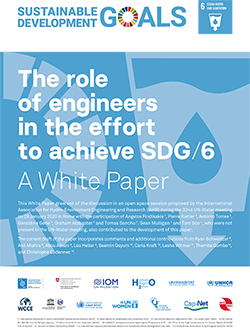The role of engineers in the effort to achieve SDG 6. A White Paper
 The purpose of this white paper is to provide an overview of the contribution of engineering to the effort to achieve the water-related Sustainable Development Goals (SDGs) of Agenda 2030 and discuss what more they should be doing, including expanding their horizons beyond the confines of their traditional engineering education and the importance of embracing a human rights-based approach. In addition, it explores how the modern paradigm of engineering, which inherently integrates nature-based approaches, contributes and enables national stakeholders to achieve the SDGs through gender-responsive, human rights-based approaches.
The purpose of this white paper is to provide an overview of the contribution of engineering to the effort to achieve the water-related Sustainable Development Goals (SDGs) of Agenda 2030 and discuss what more they should be doing, including expanding their horizons beyond the confines of their traditional engineering education and the importance of embracing a human rights-based approach. In addition, it explores how the modern paradigm of engineering, which inherently integrates nature-based approaches, contributes and enables national stakeholders to achieve the SDGs through gender-responsive, human rights-based approaches.
The white paper grew out of the discussion in an open space session proposed by IAHR during the 32nd UN-Water meeting on 29 January 2020 in Rome and is the result of a collaborative effort by representatives of IAHR, the Swiss Agency for Development and Cooperation (SDC), the International Organization for Migration (IOM), Human Right 2 Water, UN-Habitat, the UN Refugee Agency (UNCHR), the World Council of Civil Engineers (WCCE), UNESCO’s Intergovernmental Hydrological Programme (IHP), the Office of the High Commissioner for Human Rights (OHCHR), UN Women, the Women for Water Partnership (WfWP), the International Capacity Development Network for Sustainable Water Management (Cap-Net), and the International Association of Hydrological Sciences (IAHS).